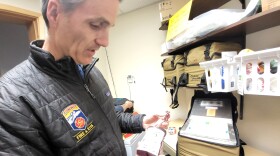The Mountain West News Bureau has six managing partner stations – Boise State Public Radio, KANW in New Mexico, KUNC in Colorado, KUNR Public Radio in Nevada, Nevada Public Radio, and Wyoming Public Media. Colorado Public Radio in Denver and KJZZ in Phoenix are associate partners and nearly a dozen other stations are affiliate members.
The bureau also produces “Our Living Lands,” a weekly radio segment exploring how climate change affects Indigenous communities, in partnership with Koahnic Broadcast Corp. and Native Public Media.
The Mountain West News Bureau was formed in 2018 and joined NPR’s network of regional newsrooms in 2025. It receives funding from Eric and Wendy Schmidt and the Corporation for Public Broadcasting.
Managing Editor: Michael de Yoanna
KUNR Mountain West News Bureau Reporter: Kaleb Roedel
-
The National Park Service started free entry days in 2009. The selection and number of days have varied, but Martin Luther King Jr. Day has been on the list ever since 2011.
-
New research highlights ways to make data center developers pay for adding demand to the power grid, reduce greenhouse gas emissions and be accountable to the public.
-
The Department of the Interior (DOI) has formally announced the establishment of the U.S. Wildland Fire Service (USWFS), a development that came the same week that the U.S. Congress declined to fund it.
-
The Interior Department’s secretarial order directs federal land managers to find places with unnecessary barriers to hunting and fishing and expand public access to outdoor recreation.
-
High number of cases in county along 3 state lines
-
Federal land managers are reopening their environmental review of a massive transmission line proposed across Nevada, a move conservation groups say could reshape how energy infrastructure is approved on public lands across the West.
-
A growing body of research suggests transfusing it early while on-scene may increase a trauma patient’s chance of survival before reaching a hospital.
-
The price of gasoline varies across the Mountain West—some states paying more than the national average
-
Across the Mountain West, where drought and shrinking reservoirs are putting pressure on already limited water supplies, decisions about who uses how much water often hinge on imperfect data. A nonprofit collaboration called OpenET hopes to change that.
-
The majority of justices upheld abortion access in Wyoming. How did we get here, and what’s next?












